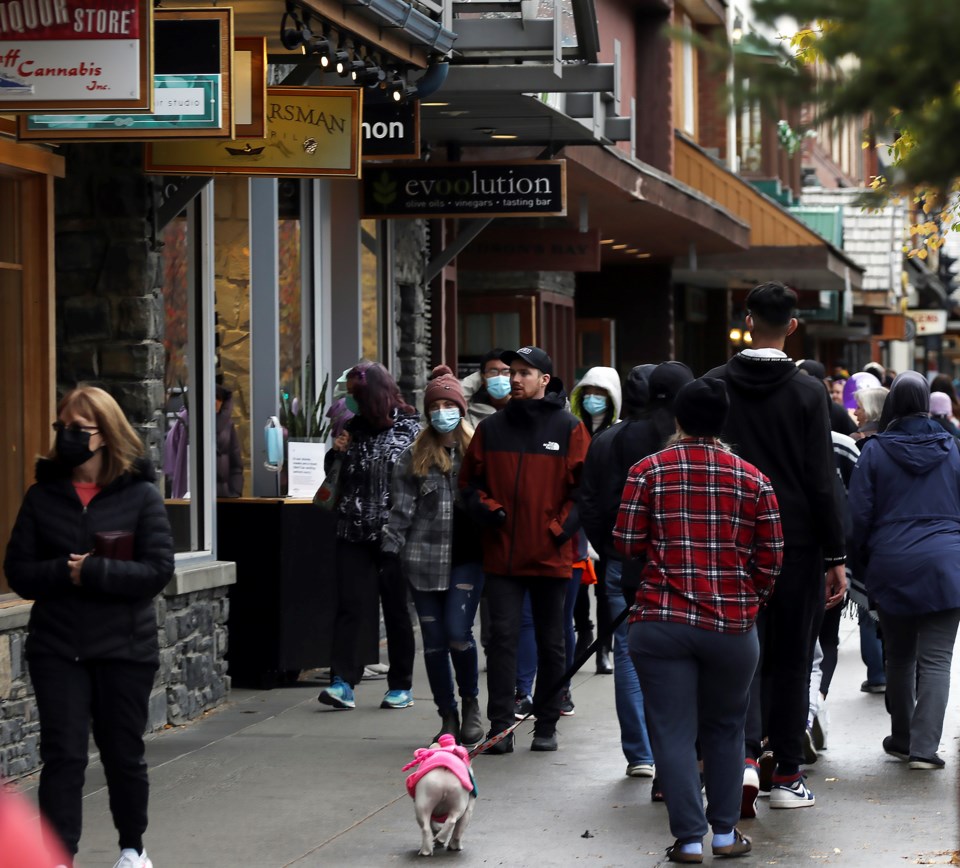BANFF – Banff’s tourism industry welcomes new federal government financial support programs to help tourism-based businesses still struggling from the economic fallout of the COVID-19 pandemic.
As the government moves away from broad-based support like wage and rent subsidies, it introduced new financial programs for businesses in selected sectors of the tourism and hospitality industry that have been deeply affected by the pandemic.
Mayor Corrie DiManno, who sits on the board of directors of Banff and Lake Louise Tourism, said it’s positive news for Banff, noting the industry and municipality have been lobbying for an extension of programs or new programs.
“We’re really pleased that the government has heard our desire to see the hardest-hit sector by COVID receive this specific type of program,” she said.
“They haven’t announced all of the details of the program yet, but we’re eager to learn what it’s going to look like.”
The emergency wage and rent subsidy programs initially announced and introduced at the onset of the COVID-19 pandemic expired on Oct. 23 as previously announced by the federal government.
Once the new program is in place, the Tourism and Hospitality Recovery Program will provide support through the wage and rent subsidy programs to hotels, tour operators, travel agencies, and restaurants and bars with a subsidy rate of up to 75 per cent.
Another one, called the Hardest-Hit Business Recovery Program, will give support through the wage and subsidy programs for other businesses that have faced deep losses, with a subsidy rate of up to 50 per cent.
Banff and Lake Louise Hospitality Association (BLLHA) welcomed the new programs.
“This news is welcome and will help the hardest hit tourism operators get through until the summer season,” said Darren Reeder, the association’s executive director.
“Having support programs identified in advance will hopefully offer operators some comfort that there is greater certainty for business planning in the event that health-related measures impact them in the coming months.”
BLLHA looks forward to getting more information from the government on the eligibility criteria.
“We hope that those in need across the whole of the tourism and hospitality sector are able to access these targeted supports, on a priority basis,” said Reeder.
A report for BLLHA prepared by Nichols Applied Management, which examined the magnitude of the drop in economic activity in the region due to the pandemic, found businesses reported revenue decreases anywhere from 40 to 90 per cent compared to a pre-pandemic year.
The COVID-19 crisis resulted in a dramatic drop in visitation, particularly bigger spending international visitors who have not returned in full force despite the border opening on Sept. 7 to vaccinated global travellers.
The authors of the report say the sharp hit to tourism, coupled with a shift in the spending pattern by these visitors, led to a drop in overall economic activity in Banff from an estimated $780 million in 2019 to $290 million in 2020.
While visitation bounced back in summer 2021, hotels in Banff and Lake Louise were at 27 per cent occupancy in June, 53 per cent in July and 63 per cent in August compared to 90 per cent in peak summer months in pre-pandemic years.
Mayor DiManno said the pandemic has been one of the most devastating times in Banff’s history, going from 100 per cent employment to 85 per cent unemployment overnight and bringing fear and uncertainty to the one-industry town.
“We saw increases in visitation this summer, which is positive, but certain businesses are still in survival mode,” she said.
“We know that the types of visitors that we saw was more regional, so we weren’t getting those overnight stays, and our tour operators and restaurants still haven’t come up to what a full recovery would look like.”
In announcing the new programs on Oct. 21, Finance Minister Chrystia Freeland said Canada’s economy is rebounding.
“It is also true, though, that the recovery is uneven and the health measures that are saving lives continue to restrict some economic activity,” she said in a news release.
“That is why today we are announcing what we very much hope and believe is the final pivot in delivering the support needed to ensure a robust recovery – for everyone.”
Expiring last week, the Canada Emergency Wage Subsidy program paid out more than $95 billion to help employers re-hire workers and avoid layoffs, while the Canada Emergency Rent Subsidy and Lockdown Support dished out more than $6.8 billion for rent and mortgages.




